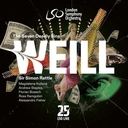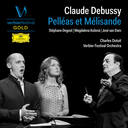Struggling to reach Wigmore Hall after the Victoria Line service imploded on Monday night — I arrived, alas, 15 minutes late — I wondered how Magdalena Kozená was faring and decided she was probably doing fine. She was singing Monteverdi, after all: music full of dramatic fire, ideal for her temperament and gifts. She had superior partners too: Andrea Marcon’s group, La Cetra. They’re famous for making the air crackle.
Yet once sitting, I was still knocked over by this singular mezzo’s demolition of the wall between singer and actor. Hand gestures were only the start. The tensed body, the anguished face, the phrasing’s expressive fury, the power of a voice without pitfalls or kinks — each fed into the most vital rendering of Lamento d’Arianna, Monteverdi’s plaint of the Cretan flower abandoned by Theseus on the island of Naxos with not even budget CDs for company.
Then, after the opening stanzas, an extra element butted in: colloquial English speech, set as skittish recitative by Kozená’s fellow Czech Marko Ivanović. It twisted the Monteverdi into a portmanteau creation called Ariana Has a Problem; wicked, funny and very pleasurable.
Joy continued as our heroine traversed Sequenza III, Luciano Berio’s solo sprint through syllable babbling, squeaks, coughing and the occasional sustained note lingering from music’s rubble. La Cetra’s gusto equally shone in their separate instrumental offerings of Marini and Dario Castello.
What didn’t work well was the grand finale: Monteverdi’s Combattimento di Tancredi e Clorinda, as staged by Ondrej Havelka. Kozená darted, crouched and lay down with breastplate, helmets and swords, looking like an escapee from a village pageant.
This extra element was an unnecessary, star-dropping distraction. Yet it couldn’t displace the concert’s chief glory: Kozená’s unadorned voice, offering all the drama that any music needs.
© The Times/ Geoff Brown



